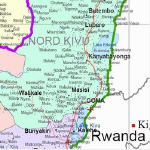
Thousands of Rwandan troops have started to leave Democratic Republic of Congo five weeks after they crossed the border to attack Hutu rebels.
A ceremony has been held in the main eastern Congolese city of Goma, to mark their withdrawal.
Rwanda's foreign minister says the joint operation "seriously weakened" the FDLR rebels but a BBC correspondent says civilians paid a heavy price.
The rebel presence in DR Congo lies behind years of conflict in the region.
Some of the FDLR leaders are accused of taking part in the 1994 Rwandan genocide, before they fled to DR Congo.
Rwanda has twice invaded its larger neighbour, saying it must take action against the mainly Hutu forces.But in January, the two countries agreed to take joint action against the FDLR.
The Rwandan forces also arrested Congolese Tutsi rebel leader Laurent Nkunda - a bitter enemy of the Congolese authorities.
Military trucks followed by some 1,500 Rwandan troops on foot crossed the border just before 1200 GMT, reports the AFP news agency.
More than 3,000 Rwandans entered DR Congo in January. Officials say they will all leave by the end of this week.
"You can't say the problem has been resolved. But they [FDLR] have been seriously weakened; their strength considerably reduced," Rwandan Foreign Minister Rosemary Museminali told state radio on Wednesday, reports the AFP news agency.
"If the Congolese troops continue the operation, we don't doubt they will achieve their goal" of annihilating the FDLR, she said.
Retaliation
Lt Col John Numbi, in charge of the joint operation, said nearly 90 Hutu rebels had been killed since the sweep began - but the BBC East Africa correspondent Karen Allen says civilians have paid a heavy price.
Some 32 people were killed by FDLR militias - apparently in retaliation for the joint military push.
The UN refugee agency has warned of a "new wave of displacement" after some 3,000 people fled their villages in the Masisi area of North Kivu - fearing more FDLR attacks.
A UNHCR spokesman on Tuesday told the BBC that the Hutu militias have returned to some of the bases which they had been forced from by the joint operation.
Gunmen are killing civilians, burning houses and raping women in North Kivu province, UNHCR spokesman David Ntengwe told the BBC.
On-and-off fighting involving the FDLR, the army and other militias has forced more than one million people in North Kivu to flee their homes since late 2006.
Related articles
- • DRC and Rwanda Sign Declaration of Principles for Peace in Eastern Congo (April 25, 2025)
- • European Union Sanctions Rwanda and M23 Officials over Congo Conflict (March 17, 2025)
- • Canada and Germany Impose Sanctions on Rwanda for Supporting M23 Rebels (March 4, 2025)
- • UK Suspends Financial Aid to Rwanda Over M23 Rebellion (February 25, 2025)
- • European Union Suspends Defence Consultations with Rwanda (February 24, 2025)
- • Tshisekedi Announces Government of National Unity and Calls for Unity Against M23 Rebels (February 23, 2025)
- • UN Security Council Calls on Rwanda to Stop Supporting M23 Rebels in DR Congo (February 22, 2025)
- • US Sanctions Rwanda's Minister James Kabarebe for Central Role in DR Congo Conflict (February 20, 2025)
- • Rwanda-Backed M23 Rebels Summarily Executed Children in Bukavu, UN Reports (February 19, 2025)
- • DR Congo Citizens Head to Polls to Elect President, Members of Parliament (December 20, 2023)
- • Ebola outbreak declared an international Public Health Emergency (July 17, 2019)
- • Peacekeepers, Congo Army to Resume Joint Fight Against Rwandan Rebels (January 28, 2016)
- • Political tensions 'running high' in DR Congo ahead of 2016 elections (October 7, 2015)
- • DRC Army Putting Pressure on FDLR (April 1, 2015)
- • Southern African Leaders to Meet in Zimbabwe (August 15, 2014)
- • Kerry Calls on Kabila to Honor Constitution (May 4, 2014)
- • Security Council extends UN mission, intervention force in DR Congo for one year (March 28, 2014)
- • Bosco Ntaganda Attacked Civilians on Ethnic Grounds, ICC Prosecutor Says (February 10, 2014)
- • No 'Peace Deal' With Defeated M23 Rebels, DR Congo Says (November 11, 2013)
- • Congo Will Not Sign a 'Peace Deal' With Defeated M23 Rebels, Government Says (November 6, 2013)
- • Congo Army Takes Control of Mbuzi Hill From M23 Rebels (November 4, 2013)
- • Kabila Congratulates Congo Army for Defeating M23 Rebels (October 30, 2013)
- • Advancing Congo Troops Take Control of Rumangabo From M23 Rebels (October 28, 2013)
- • Congo Army Liberates Rutshuru, Kiwanja and Kibumba From M23 Rebels (October 27, 2013)
- • Congo Army Dislodges M23 Rebels From Strategic Town of Kibumba (October 26, 2013)
- • Congo Army Takes Control of Kibumba After Fighting With M23 Rebels Resumes (October 25, 2013)
- • U.S. Sanctions Rwanda Over Use of Child Soldiers by M23 Rebels (October 4, 2013)
- • Rwandan Support for M23 Rebels Frustrates Attempts to End Fighting in Eastern Congo (September 26, 2013)
- • Ban Ki-moon Confirms M23 Rebels Shelled Rwanda (August 31, 2013)
- • DR Congo Will Defend Itself Against an Attack by Rwanda, Government Says (August 31, 2013)







